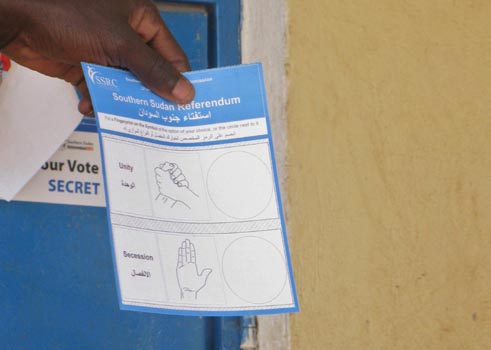John Lewis, the human rights co-ordinator with Kairos, has been in South Sudan to monitor the recent referendum for secession from the north of the country. He has been blogging about his experience; below is his final blog post. Read the entire blog by clicking here.
Kairos is a pan-Canadian ecumenical partnership working to promote human rights, justice and peace, viable human development, and ecological justice. It had its funding axed by Bev Oda, the federal minister in charge of the Canadian International Development Agency, in late 2009.
Voting wound up Saturday afternoon in Southern Sudan’s referendum on self-determination. A local singer in Juba referred to this entire process as simply “doing the paper work” of secession. It’s true, the result may be foregone. But now that voting is done, what’s next for Sudan?
Southern issues
For Southern Sudan, the issues are mostly related to governance. This will be a country blessed with natural resources, yet burdened by internal strife.
When I first came here in 2004, the Nuer and Dinka (the two main ethnic groups of Southern Sudan) were continually on the verge of conflict. It hadn’t been long since the rift between groups in the Southern rebellion had been closed and the movement reunited. In fact, the churches’ principal program here was devoted to maintaining harmony between Southern Sudanese. Today, there remains resentment over the Dinka’s control of both the liberation movement and Government of Southern Sudan (GoSS), which the newly independent nation will have to deal with quickly before tensions ignite a civil war in the South.
There have already been challenges between Dinka leaders when one SPLA commander broke away briefly from the movement after he lost support in last year’s election. The movement and GoSS need to reach out and become much more inclusive. People in Southern Sudan have put their grievances with the GoSS on hold as they wait for independence. But many of the grievances which caused splits in the past are still there.
Border region
In Abyei, there is peace for the moment. Leaders of the two rival ethnic groups in the region agreed to a treaty last week to end clashes which have marred relations there. Apparently, both sides will pay “blood money” to one another for those killed in recent fighting. People are anxious about the timing and results of Abyei’s own (postponed) referendum.
There may be a “new south” in the North, however. Populations in Blue Nile, North and South Kordofan, and South Darfur remain aggrieved. Without constructive attention, these people, already marginalized from Khartoum, may begin agitating for more control.
Will the North be isolated?
President Bashir is vowing to further entrench the Shari’a legal system which has several women’s groups and churches in the North worried. Without the moderating force of the South’s more secular government, many groups fear the increasing influence of Islamic hardliners on the government of Sudan and the potential effect on the rights of minority groups and women.
President Bashir, of course, is wanted by the International Criminal Court for his part in the ethnic cleansing of Darfur. He is largely isolated, although the U.S. has promised to remove Sudan from its list of state sponsors of terrorism with a successful referendum (Sudan in the 1990s was a safe haven for the internationally wanted, including Osama bin Laden and Carlos the Jackal.) Immediately after his visit to Southern Sudan just over a week ago, a voter in Juba commented that, “next time we will arrest him.”
Darfur
Rebels from Darfur realize they will be in a stronger position post secession, with Khartoum weakened by losing the South and territory from which to attack the rebels. They may up their demands for their own self-determination following the South’s example. Military clashes have resumed, although the key Chadian supply route for the rebels has been closed. Analysts believe the South may help Darfur’s insurgents if Khartoum continues to support militias threatening Southern populations, embroiling Darfur into a proxy war.
And then there is the oil
The 2005 Comprehensive Peace Agreement (CPA) provided for a roughly 50:50 sharing of revenues from wells in the South between the two sectors of Sudan. A similar deal is expected to continue because the North controls the infrastructure, including pipelines and refineries. This should offset any immediate economic shock in the North’s economy, already troubled by foreign currency shortages and rising rates of inflation. In the longer term, however, the South will need more of its revenues to rebuild its war-ravaged country, so the North will have to diversify away from oil. Some 70-80 per cent of Sudan’s estimated six billion barrels of oil reserves lie in the South.
What’s next?
The future of Sudan will remain challenging. The South remains extremely under-developed and the North still unstable. It remains to be seen how each region will deal with their separate and shared challenges over the next few months as the outcome of referendum becomes clearer.
Results from the referendum are expected in February.
John Lewis, KAIROS International Human Rights Co-ordinator, accredited by the South Sudan Referendum Commission, is currently in South Sudan on behalf of the Canadian churches monitoring the self-determination referendum called for in the 2005 Comprehensive Peace Agreement ending 20 years of North-South civil war.



